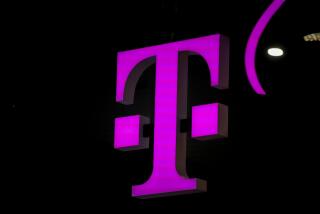T-Mobile Leads Bids for Airwaves
- Share via
WASHINGTON — T-Mobile USA is opening its pocketbook to ease the SigAlerts on its Los Angeles data highway.
The wireless provider was the big winner in the federal government’s auction of radio-wave spectrum that ended Monday, agreeing to pay $4.2 billion so it can upgrade services in Los Angeles, New York and other major cities. In all, the auction raised $13.9 billion.
With the least amount of spectrum of major wireless companies, T-Mobile needs more bandwidth, especially if it wants to offer mobile TV and other services. The company can soon start building more cellular towers to use the spectrum to carry music, video and other high-speed services already being offered by competitors.
“This was a do-or-die proposition for T-Mobile,” said Rudy Baca, a partner at Rini Coran, a Washington telecommunications and media law firm.
T-Mobile’s existing Los Angeles service is a patchwork of various signal strengths. A Los Angeles map on the provider’s website shows relatively stronger areas on the Westside, with some weaker pockets in South Los Angeles, portions of the San Fernando Valley and the area around Dodger Stadium north of downtown Los Angeles.
Baca said the auction results probably would not lead to lower prices for wireless customers, but should improve service, with fewer dropped calls and more high-speed options.
“There are winners all around on this one,” he said. “Consumers get better quality, and companies will be more competitive with each other.”
The auction, which began Aug. 9, put up 1,122 geographic-based licenses to the largest swath of high-quality wireless spectrum ever offered by the Federal Communications Commission. Much of the spectrum was being tied up by government agencies such as the Pentagon.
Combined with another chunk of licenses to be sold in early 2008, the auctions could transform the industry, nearly doubling the amount of bandwidth available in the United States for the third generation of advanced wireless services.
FCC Chairman Kevin J. Martin declared the auction “the biggest, most successful” in the commission’s history.
“Although we cannot envision our lives without access to the Internet, I believe we are only beginning to imagine the way mobile broadband networks will impact our lives -- changing the business and entertainment possibilities available to consumers,” Martin said.
T-Mobile’s competition hardly sat still during the bidding, buying billions of dollars in licenses to fill gaps in their coverages. Verizon Wireless was second to T-Mobile with $2.8 billion in winning bids. MetroPCS Communications Inc. was fourth with $1.4 billion, and Cingular Wireless was fifth, with $1.3 billion.
The third-highest bidder, at $2.4 billion, was a new entry in the wireless arena -- a consortium of major cable TV companies, including Time Warner Cable, that wants to add wireless voice and data services in hopes of offering customers one-stop high-tech shopping. A joint venture of satellite TV providers DirecTV Group Inc. and EchoStar Communications Corp. dropped out of the auction in the early rounds.
“They had a number about what they’d be willing to spend to get something close to a national footprint and the price rose too high,” Charles Golvin, a wireless analyst at Forrester Research Inc., said of the satellite TV companies.
The spectrum won’t be available for about two years because $936 million of the auction revenue must first be used to move U.S. government services off the frequencies and onto new ones. The rest of the auction money, which was at the high end of congressional estimates, will go to the U.S. Treasury.
The auction lasted 161 rounds, with 104 bidders winning a total of 1,087 licenses. Many of the bidders were small rural companies.
Anti-collusion rules prevent companies from talking about their plans for the spectrum until after the down payments are made on the winning bids.
But T-Mobile noted in a news release that it was the high bidder on 120 licenses covering not just major markets such as Los Angeles, New York and Chicago, but the rest of the United States, Puerto Rico and the U.S. Virgin Islands.
*
More to Read
Inside the business of entertainment
The Wide Shot brings you news, analysis and insights on everything from streaming wars to production — and what it all means for the future.
You may occasionally receive promotional content from the Los Angeles Times.











